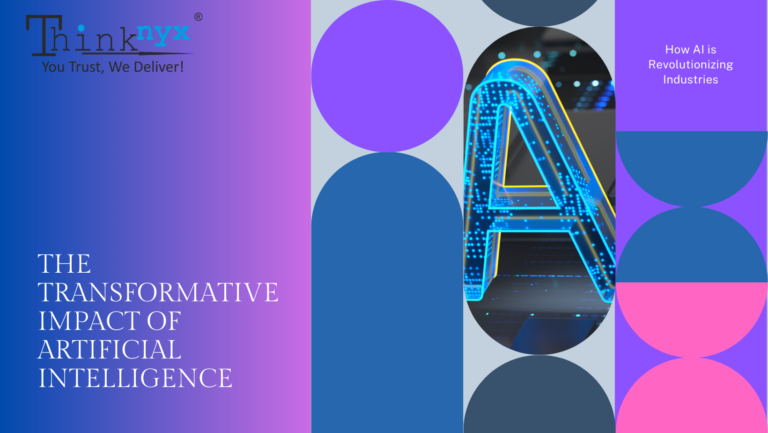
Introduction:
Artificial Intelligence (AI) has emerged as a highly influential force in today’s world, revolutionizing several industries and shaping the future of technology. From IT to healthcare, finance to manufacturing, AI is transforming the way we live, work, and interact. In this article, we will explore the transformative impact of AI on various industries, highlighting its key contributions and potential for the future.
The Impact of AI in IT Industry:

The impact of Artificial Intelligence (AI) in the field of Information Technology (IT) has been significant and continues to evolve rapidly. Here are some key areas where AI has made an impact.
- Implementing Automation for Routine Tasks: Organizations can significantly reduce the time and effort spent on routine tasks by leveraging automation. This frees up valuable resources and allows IT teams to focus on more strategic initiatives.
- Proactive Monitoring and Alert Systems: Implementing a robust monitoring and alert system is crucial for identifying and resolving infrastructure issues promptly. Real-time monitoring tools provide organizations with insights into system performance, network traffic, and potential security threats.
- Capacity Planning and Resource Optimization: Resource optimization is a key aspect of streamlining IT infrastructure management. By utilizing capacity planning tools, organizations can monitor resource usage patterns, identify bottlenecks, and optimize resource allocation.
The Impact of AI in Healthcare:

The healthcare industry has witnessed significant advancements due to the integration of AI technologies. From revolutionizing diagnostics to enhancing personalized medicine, AI is reshaping the landscape of patient care and medical research.
- Revolutionizing diagnostics and medical imaging: AI has significantly improved disease detection by enhancing the accuracy of diagnostic tools. AI-driven advancements in radiology have also transformed medical imaging. By analyzing medical images such as X-rays, CT scans, and MRIs, AI algorithms can detect minute abnormalities that might be missed by human eyes.
- Transforming patient care and personalized medicine: AI-enabled remote patient monitoring has revolutionized patient care by offering real-time insights into a patient’s condition without requiring their physical presence in a healthcare facility. AI systems can predict a patient’s response to specific drugs, allowing for personalized treatment plans with higher efficacy rates and minimal side effects.
AI's Influence on Finance and Banking:

The finance and banking industry is embracing AI to automate routine tasks, and decision-making processes shaping the future of fintech and blockchain technology.
- Automating routine tasks and improving efficiency: AI-based fraud detection and prevention systems have become indispensable for financial institutions. By analyzing vast amounts of transactional data and employing advanced machine learning algorithms, these systems can detect potentially fraudulent activities in real-time, minimizing financial losses.
Robotic Process Automation (RPA) is another AI-powered technology that automates repetitive tasks in financial institutions, improving efficiency and reducing human error. RPA systems can handle tasks such as data entry, customer onboarding, and report generation, allowing human employees to focus on more complex and strategic activities. - Enhancing decision-making and risk management: AI-powered predictive analytics has transformed investment strategies by analyzing vast amounts of financial data, market trends, and historical patterns. These algorithms can provide valuable insights into market trends, helping investors make informed decisions and optimize their investment portfolios.
- Shaping the future of fintech and blockchain technology: AI’s integration with fintech innovations is at the forefront of transforming financial services. By leveraging AI algorithms, fintech companies are revolutionizing services such as digital payments, peer-to-peer lending, and cryptocurrency trading, making financial services more accessible, efficient, and secure.
AI's Disruption in Manufacturing and Automation:

AI is redefining manufacturing processes and automation, leading to enhanced production, optimization, and the concept of smart factories.
- Revolutionizing production processes and optimization: Implementing AI-based quality control mechanisms improves production processes by identifying defects and anomalies at an early stage, reducing waste, and ensuring consistent product quality. AI systems can analyze sensor data, detect pattern deviations, and trigger corrective actions, leading to improved efficiency and customer satisfaction.
Automated predictive maintenance in manufacturing is another game-changer. By employing AI algorithms and IoT-powered sensors, manufacturers can predict equipment failures, schedule maintenance activities in advance, and minimize costly downtime. This proactive approach reduces maintenance costs and enhances production efficiency.
AI's Influence on Transportation and Mobility:

The transportation and mobility industry is witnessing a significant transformation through the integration of AI technologies. From creating safer autonomous vehicles to revolutionizing urban planning, AI is reshaping the way we move.
- Revolutionizing autonomous vehicles and transportation systems: AI algorithms play a crucial role in advanced driver-assistance systems (ADAS), enabling vehicles to perceive their surroundings, make critical decisions, and respond to complex driving scenarios. By analyzing sensor data, such as images, lidar, and radar, AI enables autonomous vehicles to navigate safely and efficiently on the roads.
Enabling self-driving cars is another significant milestone achieved through AI. By utilizing machine learning and computer vision algorithms, self-driving cars can recognize traffic signs and signals, detect obstacles, and make real-time driving decisions, reducing accidents and improving road safety. - AI-powered traffic management systems: Optimize the flow of vehicles on roads, reducing congestion and improving overall transportation efficiency. By analyzing real-time traffic data, these systems can dynamically adjust traffic signal timings, optimize lane assignments, and facilitate smoother traffic flow.
Conclusion:
These examples underscore the multifaceted impact of AI in restructuring industries, enhancing efficiency, fostering innovation, and addressing challenges across various sectors.
As AI technologies progress, their influence is poised to broaden, unlocking fresh opportunities, and fundamentally transforming the operational landscape of businesses.